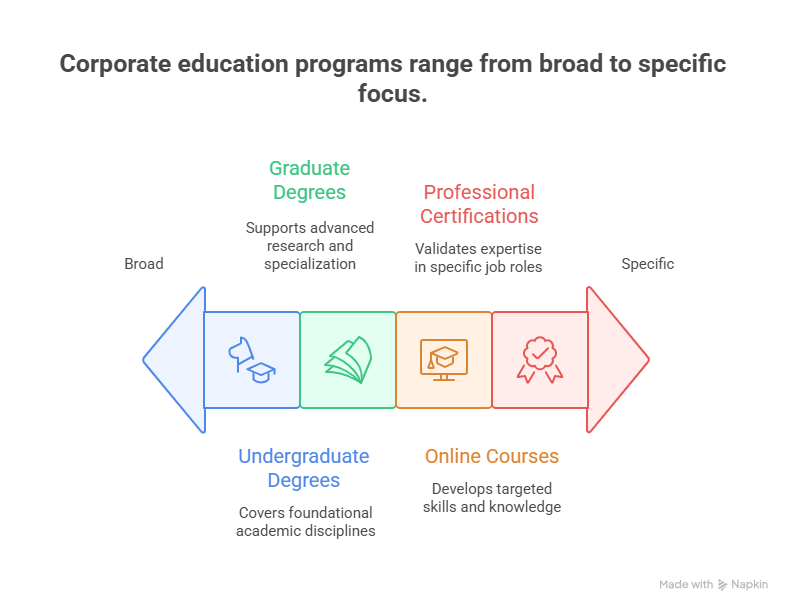Were you aware that corporations such as Amazon and Starbucks provide their staff with substantial tuition assistance? Investing in employee development is a smart way for businesses to draw in and keep top talent in today’s competitive labor market.
These corporate education reimbursement programs help staff members advance their education and develop their knowledge and abilities. Businesses show their dedication to staff development by providing such employer tuition assistance, which raises job satisfaction and lowers turnover rates.
We’ll examine these programs’ operations, the kinds of education they cover, and the businesses that provide exceptional tuition assistance benefits as we continue our investigation.
Understanding Education Reimbursement Corporate Programs
As a component of their employee education benefits packages, businesses are increasingly providing education reimbursement. The significance of ongoing learning and development in the contemporary workplace is becoming increasingly recognized, as evidenced by this trend. Businesses can improve retention rates, increase job satisfaction, and develop employees’ skills by offering corporate learning programs.
How These Programs Work
Corporate education reimbursement programs are intended to assist staff members in paying for their additional education. After employees have finished their coursework, these programs usually reimburse them for their tuition costs. Employees typically have to fulfill specific requirements, like working for a minimum amount of time or keeping up a certain grade level, in order to be eligible. Proof of enrollment and completion must frequently be submitted as part of the reimbursement process, which is then approved.
The details of these programs can differ greatly between businesses. A percentage of the entire tuition costs may be reimbursed by some organizations, while others may offer a set amount each semester or year. Maximizing the benefits of employee education requires an understanding of the specifics of your company’s program.
Types of Education Covered
These corporate programs can cover a wide range of educational subjects. Traditional undergraduate and graduate degree programs are offered by many companies, while online courses and professional certifications are offered by others. Some companies might even pay for classes that are relevant to a worker’s present position or future professional goals.
| Type of Education | Coverage Details | Examples |
|---|---|---|
| Undergraduate Degrees | Tuition reimbursement for full-time or part-time study | BA, BSc, BEng |
| Graduate Degrees | Reimbursement for master’s or doctoral programs | MA, MSc, MBA, PhD |
| Professional Certifications | Coverage for certification courses and exams | CPA, CMA, ITIL |
| Online Courses | Reimbursement for online degree programs or skill-based courses | MOOCs, Coursera, Udemy |

You can decide on your educational goals and professional development by being aware of the particulars of your company’s corporate learning program. These programs can be a useful tool whether you want to advance your current career or take on a new role.
Top Companies with Outstanding Tuition Assistance Benefits
Support for corporate education has grown to be a crucial component of employee satisfaction, with a number of leading businesses setting the standard. These companies recognize the importance of making long-term investments in their workers’ futures by implementing extensive tuition reimbursement programs.
Tech Giants: Apple, Google, and Amazon
Tech behemoths like Apple, Google, and Amazon are leading the way in providing outstanding educational advantages. These businesses encourage staff members to pursue further education and skill development by offering comprehensive tuition reimbursement programs. For example:
- For approved courses, Apple provides up to $5,000 in annual tuition assistance.
- Google supports its employees’ academic endeavors by offering a generous tuition reimbursement program.
- One of the many educational benefits that Amazon provides to its staff members is a tuition reimbursement program that fosters professional growth..
Healthcare Leaders: UnitedHealth Group and CVS Health
There are also businesses in the healthcare industry that offer exceptional tuition assistance benefits.Notable examples of companies that show their dedication to staff education through generous tuition reimbursement policies are UnitedHealth Group and CVS Health.
Among their programs’ salient characteristics are:
- UnitedHealth Group helps its employees reach their educational objectives by providing a tuition reimbursement program.
- Tuition for authorized courses is covered by CVS Health’s education assistance program.
Retail and Service: Starbucks and Walmart
investments in the education of their staff. Both businesses provide extensive tuition reimbursement plans aimed at advancing workers’ professional goals.
Among the main features of their tuition assistance benefits are:
- The Starbucks College Achievement Plan is a tuition reimbursement program that covers the cost of tuition for online degree programs.
- Walmart offers a tuition reimbursement program to encourage staff members to pursue further education and professional development.
By implementing tuition reimbursement programs, these businesses are establishing a high bar for corporate education support and highlighting the value of making investments in the futures of their employees.
Maximizing Your Employee Education Benefits
By making good use of their company’s education reimbursement programs, employees can greatly increase their opportunities for professional growth. It’s crucial to comprehend the particulars of the program your employer offers in order to accomplish this.
Navigating Company Policies and Requirements
You must first become familiar with the policies and requirements of your organization in order to optimize your benefits. This entails being aware of the kinds of programs or courses that qualify for reimbursement, how to submit a request for reimbursement, and any due dates.
To stay eligible for the program, for example, some employers might mandate that staff members maintain a particular grade or finish a predetermined number of credits within a predetermined amount of time. You can better organize your academic goals if you are aware of these requirements.
Tax Implications of Tuition Assistance
The tax consequences of tuition assistance are yet another important factor to take into account. Up to $5,250 annually, employer-sponsored educational assistance is typically tax-free in the US. This exemption, however, only applies to classes that are required for a degree program or that are relevant to the worker’s current position.
| Tax Exemption Limit | Applicability | Conditions |
|---|---|---|
| $5,250 per year | Employer-provided educational assistance | Courses related to the current job or part of a degree program |
Balancing Work and Educational Pursuits
Although juggling work and school can be difficult, it is possible with careful preparation. In order to make sure that their work obligations are not adversely affected, employees should think about talking to their manager about their educational goals.
You can successfully balance work and school obligations by setting priorities for your tasks and managing your time well. This will help you advance in your career and eventually increase employee educational funding.
Conclusion: Advancing Your Career Through Corporate Learning Opportunities
Programs for corporate education reimbursement give workers a great chance to grow in their careers. Employees can make well-informed decisions regarding their educational goals by being aware of the types of education covered by these programs and how they operate.
Leading businesses provide exceptional tuition assistance benefits as part of their employee education packages, including tech behemoths like Apple and Google, healthcare industry titans like UnitedHealth Group, and retail behemoths like Starbucks. In addition to fostering employee development, these employer tuition assistance programs aid businesses in luring and keeping top talent in a competitive labor market.
Employees should carefully review company policies and requirements, think about the tax ramifications of tuition assistance, and successfully balance work and educational endeavors in order to optimize the benefits of an education reimbursement corporate program. Employees can improve their skills and career prospects by doing this and taking advantage of corporate learning opportunities.
Investing in employee education will probably continue to be a crucial business strategy as the labor market changes. Workers can set themselves up for long-term success and career advancement by utilizing these programs.
FAQ
What is a corporate education reimbursement program?
One benefit that companies provide to their employees to assist with the cost of advancing their education and improving their skills and knowledge is corporate education reimbursement.
How do corporate education reimbursement programs work?
While eligibility requirements and reimbursement procedures vary by employer, most of these programs reimburse employees for tuition costs after they have finished their coursework.
What types of education are typically covered under corporate education reimbursement programs?
Numerous programs offer a broad range of learning opportunities, such as online courses, professional certifications, undergraduate degrees, and occasionally even graduate degrees, contingent on the policies of the organization.
Are there any tax implications associated with tuition assistance benefits?
Indeed, there are tax ramifications to take into account because, depending on the circumstances, tuition assistance benefits may be taxable. Knowing these ramifications is essential to optimizing the benefit’s value.
Can you provide examples of companies known for their outstanding tuition assistance benefits?
Businesses that support their employees’ pursuit of higher education and skill development, such as Apple, Google, Amazon, UnitedHealth Group, CVS Health, Starbucks, and Walmart, are renowned for their extensive education reimbursement programs.
How can employees balance work and educational pursuits while utilizing corporate education reimbursement programs?
In order to maximize the benefits of education while still fulfilling their job obligations, employees must carefully plan, manage their time, and occasionally modify their work schedules.
What are the benefits of corporate education reimbursement programs for employers?
Companies show their dedication to employee development by providing such programs, which eventually improves the organization as a whole by increasing job satisfaction, lowering attrition, and producing a more skilled workforce.
How can employees maximize their corporate education reimbursement benefits?
By comprehending company policies, navigating the reimbursement process, and making well-informed decisions regarding their educational pursuits that are in line with both company requirements and career goals, employees can optimize their benefits.




